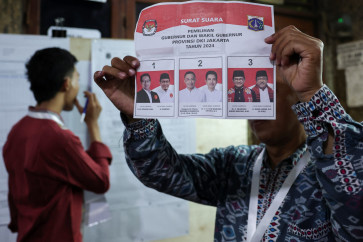Popular Reads
Top Results
Can't find what you're looking for?
View all search resultsPopular Reads
Top Results
Can't find what you're looking for?
View all search resultsPolice reforms failed, says human rights watchdog
Human rights monitor Imparsial said Monday that after 12 years of reform, the police had failed to reform the institution due to weak supervision and lenient sanctions for criminal officers
Change text size
Gift Premium Articles
to Anyone
H
uman rights monitor Imparsial said Monday that after 12 years of reform, the police had failed to reform the institution due to weak supervision and lenient sanctions for criminal officers.
Imparsial managing director Poengky Indarti said that both external and internal supervision of the police was lax, with officers at different levels tending to protect each other, causing impunity among unscrupulous police officers.
“The police Internal Affairs Division and General Supervision Inspectorate are places for the officers to seek protection, particularly in cases involving political interests and violence against women,” she said at a launch to release the results of the organization’s study on “a portrait of irregularities within the police body in the reform era” at Imparsial offices in Jakarta.
She also criticized the role of the National Police Commission, a body tasked with receiving public reports on the police, saying the commission, which has limited investigative authority, failed to effectively follow up on the reports.
“In some recent cases, especially those centering around judicial corruption, the commission’s role was no more than a complementary institution without active contribution or constructive suggestions,” Poengky said.
She also raised concerns about lenient punishment for police officers involved in crime. She added that most cases involving police officers were not taken to court.
“Some officers were just demoted rather than being dismissed from their posts,” she said.
Imparsial program director Al-Araf said there were nine irregularities in police institutions: police brutality, involvement in illegal logging, involvement in judicial corruption, corruption, political non-neutrality, involvement in crime, sexual harassment and violence against women, arbitrary detention and overlooking violence conducted by certain groups.
Imparsial’s report said that between 2005 and 2010, there were 135 cases of violence by police officers against civilians. There were 49 criminal cases involving police officers between 2002 and 2010, and during the same period, there were 161 cases of arbitrary detention and treatment.
He urged the government to strengthen the authority of the National Police Commission in supervising police work to prevent abuse of power or judicial corruption. He also suggested the commission establish provincial branches to monitor provincial police institutions.
“The commission should be granted the right to investigate reports filed by the public,” he said.
Al-Araf said the government should transform the commission into an independent body without government involvement in its leadership to prevent political motives from tainting its work.
Imparsial also suggested several points of recommendation to improve the police reform program, including placing the police under a specific department, rather than under the Presidential office, to prevent political influence and allow for the establishment of a team to supervise case investigations.
Indonesia Corruption Watch deputy coordinator Emerson Yuntho said the National Police failed to show satisfactory performance in handling corruption cases, both inside and outside the institution.
He said that there were currently 20 high-profile corruption cases being handled by the National Police, in which progress was unclear, with cases being suspended or even dropped entirely without explanation.
“Bribery and extortion are still widespread in the legal process,” he said during a discussion in Jakarta on Sunday.
Emerson said the most fundamental problem in reforming the police was the low level of political will from President Susilo Bambang Yudhoyono and his administration to unravel corruption cases within police institutions.
He suggested that police should no longer handle corruption cases, but focus on other areas such as security, terrorism, crime and drugs. He said corruption cases were better handled by the Corruption Eradication Commission or the Attorney General’s Office. (rdf)










